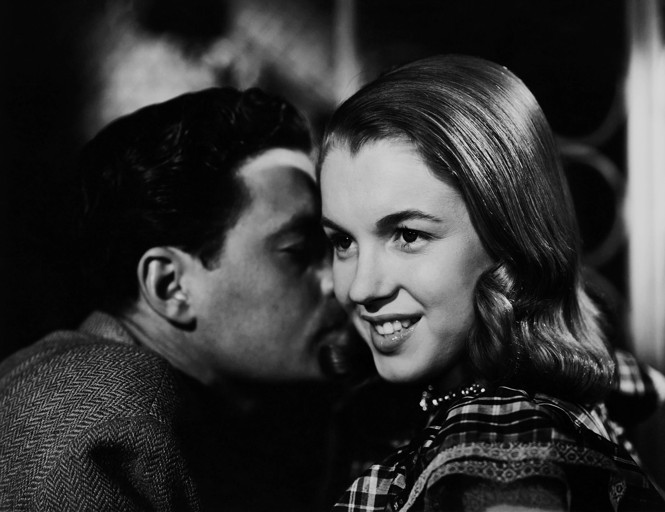
Most films that are widely reviled upon release simply evaporate into their own disfavor. Yet Andrew Dominik’s recent Netflix film, Blonde, has lingered in the public consciousness weeks after its release and subsequent criticism for a simple reason: the enduring star power of Marilyn Monroe.
The film is based on Joyce Carol Oates’s 2000 novel, which promised 20 years ago to reveal, through fiction, the real person behind the celebrated image. “I have to tell you immediately that I never would have written any book about Marilyn Monroe,” Oates said in an interview promoting the novel at the time. “I got very interested in writing about an American girl who is Norma Jeane Baker who becomes a celebrity later in life … To me, she’s always Norma Jeane.” It was hardly a new idea then, and it isn’t one now. The idea that Norma Jeane is more important than Marilyn Monroe will not fade away, as both the premise of Blonde and its critical reception make all too clear.
Since the first studio-written press release in 1946, the search for the real Norma Jeane behind the supposedly artificial persona of Marilyn Monroe has driven endless stories. Having studied the myths around Monroe for many years and analyzed them in my book The Many Lives of Marilyn Monroe, I have seen how persistent and popular these tropes remain. We talk endlessly about the myth of Marilyn Monroe, but the myth of Norma Jeane is its foundation, encouraging people to express open contempt for the “fake” Monroe by pretending to love the “real” Norma Jeane instead. In fact, Marilyn Monroe was a real person in every way recognized by our culture—except in our stories about her.

Those stories, which insist that Monroe destroyed the real Norma Jeane, have circulated for decades. To Elton John in “Candle in the Wind,” Monroe was really Norma Jeane: “Goodbye Norma Jean / From the young man in the 22nd row / Who sees you as something as more than sexual / More than just our Marilyn Monroe.” She was Norma Jeane to her earliest biographers, including Fred Lawrence Guiles, who published Norma Jean: The Life of Marilyn Monroe in 1969 (later correcting the spelling to “Jeane,” as it appears on her birth certificate). Norman Mailer closed Marilyn (which he called a “novel biography,” because he fictionalized at will) with the words “Goodbye, Norma Jean,” in 1973—the same year that Elton John sang them. Gloria Steinem’s 1986 biography, Marilyn: Norma Jeane, went in search of the real Norma Jeane; a decade later, the photographer George Barris introduced a book by declaring, “Her biggest enemy was Marilyn Monroe. Her true self was little Norma Jeane.”
The idea that Norma Jeane is both the real Monroe and a different person from Monroe is the myth of Marilyn Monroe. It is a fundamentally misogynistic idea, blaming Monroe for the contempt with which she is treated. Dominik promoted his film by implying to a journalist that Monroe’s films aren’t worth watching, adding that Gentlemen Prefer Blondes, in which Monroe delivers one of the greatest musical-comedy performances ever filmed, is merely about two “well-dressed whores.” When Monroe left the baseball legend Joe DiMaggio in 1954, a stranger handed her a letter with the word whore written in shit. Nothing has changed: People are still shitting on Marilyn Monroe.
Regardless of how unconscious it may be, reducing the staggeringly successful Monroe to “little Norma Jeane” has the undeniable effect of denying her power, keeping her infantilized, pathologized, and always less than a whole self. Or too many selves, as when Mailer pronounced that Monroe was always “living with the full equivalent of two people within her.” Either way, something must be wrong with Monroe—rather than with society’s attitude toward her.
That fundamental contempt for the very idea of Marilyn Monroe bleeds into any number of unquestioned clichés about her. One, for example, is that she hated herself—as proved, supposedly, by the tragic circumstances of her death. Little that Monroe actually said suggests this is true. In many interviews, especially in the fullness of her stardom, she spoke of self-respect, insisting upon her self-worth, asking people to take her seriously. Monroe’s drug addiction was self-destructive, yes, but it also likely spun beyond her control before she comprehended its dangers. Addiction doesn’t have to be a symptom of self-hatred: It might also provide escape from the derision of others.
Another denigrating cliché featured in Blonde, for which the film has been widely criticized, is that Monroe was always the passive object of external forces. As Oates said in 2000, “Actually I never wanted to write about Marilyn Monroe. It was something that happened to me, the way her life happened to Norma Jeane.” But Marilyn Monroe’s life did not happen to Norma Jeane. Norma Jeane is only significant because she created Marilyn Monroe. If Norma Jeane had not turned herself into Monroe, we would never have heard of her. But we don’t speak of Monroe as being the agent of her own transformation; instead, we speak of her passively Becoming Marilyn—which is also the title of a recent French documentary, a stage show, and countless headlines over the years, including a number of recent descriptions of Ana de Armas’s performance in Blonde.
We still refuse to do Monroe the basic justice of crediting her for her own stardom. “She started out with less than any girl I ever knew,” the head of her first modeling agency once said, “but she worked the hardest … She wanted to learn, wanted to be somebody, more than anybody I ever saw before in my life.” Monroe was not put on a treadmill; she pushed and shoved her way onto it, and then beat the competition. Nor did anyone make her change her name: A casting director suggested it, and Monroe, hungry for stardom, agreed. “Monroe” was, in fact, her mother’s maiden name, and thus has considerably more claim to be Monroe’s “real” name than the shifting patronyms of her insecure childhood.
She legally changed her name to Marilyn Monroe soon after she started her own production company: There is no reason to view her name change as anything other than a triumphant assertion of her identity. She is globally recognized as Marilyn Monroe 60 years after her death, yet people keep lamenting the loss of Norma Jeane. Cary Grant famously said that everyone wanted to be Cary Grant, including him—but no one says Archie Leach is the real Cary Grant. Nobody sings, “Goodbye, Frances Gumm”; everyone prefers Judy Garland. We also prefer Marilyn Monroe, but we flatly refuse to admit it.
There is another Marilyn Monroe, recalled by those who actually knew her—a woman of tremendous determination, ambition, humor, and dedication to her craft. Her addiction to pills was serious; her stage fright was real and disabling; every one of her successes was met with mockery and gaslighting. She rose above it all, fighting back, fighting them off, showing them up, until the day she took too many of the pills she routinely took too recklessly. Dominik’s film assumes she deliberately killed herself, but this is by no means certain.

“Everybody knows about her insecurities,” another Monroe biography quoted her friend, the photographer Sam Shaw, as saying, “but not everybody knows what fun she was, that she never complained about the ordinary things of life, that she never had a bad word to say about anyone, and that she had a wonderful, spontaneous sense of humor.” The truly rare tribute to Monroe would focus on her survivalism, her ambition and wit, the courage with which she fought her detractors. It would show Monroe studying literature at UCLA at night, her sustained reading in psychoanalysis, and, above all, the seriousness with which she approached acting as an art form. It would depict her political commitments, her support for racial and sexual equality, her hatred for McCarthyism and defiance of the House Un-American Activities Committee, her interest in the Kennedys’ progressive agenda (as opposed to a lovelorn hope that they would leave their wives for her), and her dislike for Nixon, whom she compared to some of the “born cowards” who ran Hollywood. She disdained Mailer too, refusing to meet him; after reading his Hollywood novel The Deer Park, she reportedly said that he was “too impressed by power,” adding, “You can’t fool me about that.” This Monroe also exists in the public record—but is not the one who circulates in our stories about her.
The great struggle of Monroe’s life wasn’t her struggle against addiction, depression, and loneliness—it was her struggle for respect, which our culture still denies her. “Some people have been unkind,” she once said. “If I say I want to grow as an actress, they look at my figure. If I say I want to develop, to learn my craft, they laugh. Somehow they don’t expect me to be serious about my work. I’m more serious about that than anything." Monroe wanted, above all, to progress and improve, but we don’t let her change—because then we’d have to change our minds and admit that she was one of America’s great success stories, instead of one of its favorite tragic myths. In truth, Marilyn Monroe offers one of the purest instances of the old American promise of reinvention. And, on the evidence of stories such as Blonde, we continue to evolve considerably less than she did.







